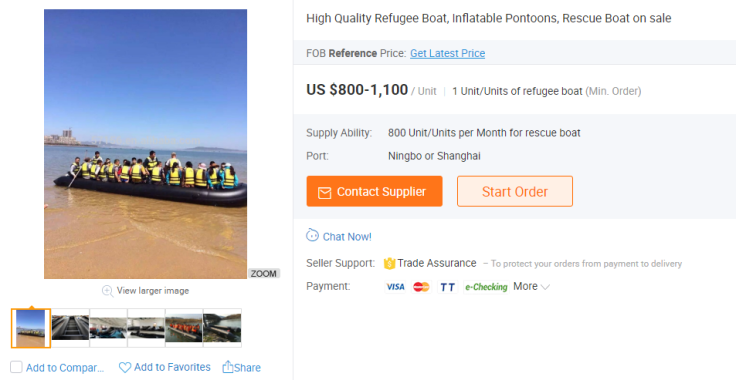'High-quality refugee boats' sold by Chinese company - life jackets optional
EU wants China to end sales of dinghies to curb human smuggling via the Mediterranean.
A Chinese manufacturing company is selling what it claims are "high-quality refugee boats" that can be delivered by sea, air, or door to door.
Zhejiang Anji Huayu Boat Development, located in the Yangtze River Delta region, is advertising the boats – sold for between $800 and $1,100 (£615 - £846) – on the Chinese website of e-commerce company Alibaba.
The inflatable boats can carry between 25 and 30 passengers and are available in different colours.
According to the website, the product has been sold in several countries, including Australia, which "liked it the most".
This is not the first time that similar advertisements have appeared on Alibaba.com.
Annemarie Loof, who oversees the search and rescue work of charity Doctors Without Borders (MSF), told the Middle East Eye that the sale of such boats was "irresponsbile" and put the lives of migrants further at risk.
"It is highly irresponsible that these kinds of inflatable dinghies are actually being advertised as quality refugee boats," she said.
"Unscrupulous smuggling networks are only focused on maximising their profits, and the use of these types of unseaworthy vessels has only made the crossing by sea even deadlier."
Loof, however, added that the sale of the boats are just a symptom of a wider problem and asylum seekers will continue to embark on perilous journeys until safe and legal routes are provided.
A spokesperson for Alibaba told IBTimes UK: "Alibaba.com does not tolerate product listings that suggest illicit or illegal behaviour and we have policies and procedures in place to deal with sellers who violate the law or our terms of use."

Last year, a report on the results of Operation Sophia, the European Union's naval mission to tackle human smuggling in the Mediterranean Sea, found that smugglers were buying dinghies from Chinese companies.
The report, leaked by Wikileaks in February 2016, found that the boats were transported to Libya, one of the major gateways for Sub-Saharan migrants trying to reach Europe, through Malta and Turkey.
The EU has asked China to help the bloc tackling human smuggling by stopping selling dinghies used by traffickers to transport people across the Mediterranean.
"The rubber boats used by the smuggler networks in the Mediterranean are fabricated somewhere in China, they are exported to the countries in Asia and they are used by them," EU Commissioner for Migration, Dimitris Avramopoulos, said in May, according to Reuters.
"So I requested the support and cooperation from the Chinese authorities in order to track down this business and dismantle it, because what they produce is not serving the common good of the country. It is a very dangerous tool in the hands of ruthless smugglers."
EU-Libya accord
In February, the UN-backed government in Libya and Italy reached an agreement to curb the number of people crossing the Mediterranean and combat people smuggling.
As regards the accord, Italy and the EU committed to providing funds and training to the Libya Coast Guard to stop boats from reaching Italian shores.
In August, Italy sent a naval mission to help the LCG prevent boats with migrants from reaching its shores. The ships were sent after the country approved a plan known as 'Fortress Europe'.
At the time of the February accord, the UN and human rights groups warned the agreement would put in danger thousands of migrants who would be kept in "inhumane conditions" at illegal detention centres in Libya.
A report published on 9 August collated interviews with migrants who alleged they had been raped, tortured and sold as slaves in Libya before they managed to cross the mediterranean Sea to reach Italy.
At least 600,000 migrants have made it to Italy since 2014 with more than 180,000 arriving via Libya in 2016. Over 95,000 have already arrived since the beginning of 2017.
© Copyright IBTimes 2025. All rights reserved.






















